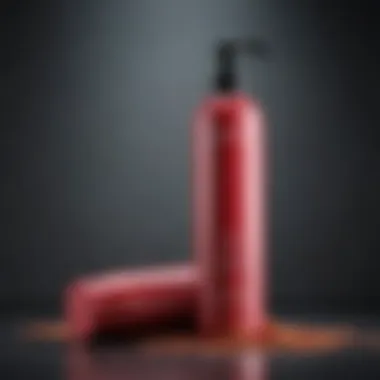Top Ten Best Shampoo and Conditioner for Hair Care


Intro
In today's world, hair care is not just a routine; it is a personal statement and an essential component of overall well-being. With a myriad of options available in the market, selecting the right shampoo and conditioner can seem daunting. This article aims to shed light on the best products tailored for enhanced hair care, ensuring that readers make informed decisions for their unique hair types.
The focus will be on unique formulations, the benefits they provide, and their suitability for various hair concerns. Understanding ingredient quality and sustainability in hair products is also vital as consumers become more environmentally conscious. By exploring both user reviews and expert recommendations, we can uncover the most effective choices available today.
Fashion Trends
Street Style Inspiration
Hair plays a significant role in fashion. The style of your hair can elevate your overall appearance, making it just as important as the clothes you wear. Fresh and vibrant hair can create a lasting impression and set trends. Incorporating hair care as a vital part of your beauty regimen enhances not only your hair but also complements your street style.
Sustainable Fashion
Sustainability is at the heart of modern beauty and hair care trends. As consumers seek environmentally friendly products, many brands are focusing on sustainable practices. This includes using responsibly sourced ingredients and eco-friendly packaging. Supporting brands that prioritize sustainability not only benefits your hair but also contributes to a healthier planet.
Beauty Tips
Hair Care and Styling
A well-chosen shampoo and conditioner are foundational for healthy hair. Understanding your hair type is essential in selecting the right products. For instance, those with oily hair may benefit more from clarifying shampoos, while those with dry hair might prefer moisturizing formulations. Tailoring your hair care routine to your specific needs will yield optimal results.
- Know your hair type: Assess whether your hair is oily, dry, or normal.
- Choose accordingly: Select products that explicitly target your concerns, such as frizz or damage.
- Stay consistent: Regular use of the right products can lead to significant improvements in hair health over time.
Product Reviews
Comparison Guides
This section will delve into the top ten best shampoo and conditioner sets, examining factors like effectiveness, scent, and user satisfaction. By comparing products side-by-side, readers can find the ideal match for their hair care needs. Each product will be analyzed based on formulation and long-term results.
Brand Spotlights
Some brands have garnered a loyal following due to their quality and commitment to hair care:
- Olaplex: Known for repairing damaged hair.
- Moroccanoil: Emphasizes hydration and shine.
- Aveda: Focuses on utilizing natural ingredients and sustainability.
Through careful exploration and analysis, readers will gain insight into which shampoo and conditioner would best enhance their hair care routine. Understanding these products in detail ensures informed decisions that contribute to personal style and well-being.
"The right hair care products can transform your everyday hair routine into a ritual of self-care and indulgence."
Preamble to Hair Care
Hair care holds a significant position in personal grooming and self-expression. The choices made in shampoo and conditioner can range from addressing specific hair concerns to enhancing overall hair health. This article explores these choices in depth, guiding readers through the best products available today.
A proper hair care routine establishes a foundation for hair vitality. This means not just choosing a product for its marketing appeal, but for its ingredients and how well it meets individual hair needs.
Understanding the Importance of Shampoo and Conditioner
Shampoo and conditioner serve distinct but complementary purposes in hair care. Shampoo is essential for cleansing the scalp and hair, removing dirt, oils, and product buildup. Selecting the right shampoo can impact scalp health, influencing hair growth and appearance.
Conditioner, on the other hand, focuses on nourishment and moisture. It helps to detangle hair, reduces frizz, and enhances shine. The right conditioner can significantly improve hair texture, making it easier to manage. Therefore, understanding which products to use was a major aim of our exploration into hair care.
"Choosing the right shampoo and conditioner can transform not just the hair itself, but how one feels about their overall appearance."


How Hair Type Influences Product Selection
Hair type profoundly influences the choice of shampoo and conditioner. There are several classifications: straight, wavy, curly, and coily. Each type has unique needs that affect how products perform.
For instance, straight hair generally requires lightweight formulations to avoid greasiness. Wavy hair benefits from volumizing products. Curly and coily hair often needs rich moisturizing ingredients due to its structure, which makes it more prone to dryness.
When selecting products, it is crucial to consider the following factors:
- Moisture Needs: Curly hair often requires more hydration compared to straight hair.
- Scalp Condition: An oily scalp may need a clarifying shampoo, while a dry scalp benefits from moisturizing formulas.
- Heat and Chemical Damage: Damaged hair types must prioritize repair-focused products.
In summary, recognizing one’s hair type not only simplifies the selection process but optimizes results for healthier, shinier hair.
Criteria for Evaluation
In choosing the best shampoo and conditioner, several criteria should guide your decision-making process. These elements help to ensure that the products not only meet personal preferences but also align with the health of your hair. Evaluating these criteria can significantly enhance your overall hair care experience.
Ingredient Quality and Safety
The foundation of any shampoo or conditioner lies in its ingredients. Understanding the quality and safety of these components is crucial. Ingredients should be free from harsh chemicals like sulfates, parabens, and artificial fragrances, which can strip the hair of necessary oils. Many people are now turning toward products that utilize natural extracts and oils, enhancing the nourishment to the hair.
When reviewing product labels, prioritize ingredients like jojoba oil, argan oil, and essential vitamins. These substances are known for their ability to strengthen the hair and provide hydration. Always look for certifications or independent testing results that can verify product safety. Maintaining a focus on quality not only benefits your hair but also impacts your overall health.
Effectiveness for Various Hair Types
Hair is not uniform, and different types require distinct care. Evaluating the effectiveness of shampoos and conditioners for specific hair types is essential. For example, products that are beneficial for curly hair often provide greater moisture, while those for fine hair focus more on volume without weighing it down.
Additionally, consider the specific concerns associated with your hair type—be it dryness, color-treated hair, or damage from heat styling. Some products are formulated to cater to these needs directly. Recognizing your hair type will lead to a more tailored hair care routine, ensuring better results and hair health.
User Experience and Reviews
Customer feedback plays a vital role in the evaluation process. User experience can shed light on the practical effects of the products. Reading reviews can provide insights into how a shampoo or conditioner actually performs over time, revealing any strengths or weaknesses.
Look for testimonials that address the texture, scent, and long-term effects on hair health. Often, other users share their experiences with similar hair types, making it easier for you to gauge reliability. A product with a high number of positive reviews is more likely to meet your needs.
Sustainability and Ethical Considerations
The market is increasingly moving towards sustainability, reflecting a growing awareness of ethical practices. Evaluating the eco-friendliness of products can enhance your choices. Many brands now provide details about their sourcing, production methods, and environmental impact. This includes cruelty-free testing and recyclable packaging.
Consider opting for brands that are transparent about their practices, as this helps contribute to a more sustainable industry. Beyond individual choices, supporting ethical companies promotes positive change across the beauty sector.
"The choices we make in our hair care can influence not just our personal well-being but also have widespread effects on the environment."
In summary, these criteria—ingredient quality, product effectiveness for hair types, user feedback, and sustainability—should be carefully considered. They provide a structured approach to navigating the wide array of shampoo and conditioner options available today.
The Best Shampoos
Selecting the right shampoo is essential for maintaining healthy hair. Shampoos play a significant role in the overall hair care routine. They clean the hair by removing dirt, oil, and product buildup, preparing the hair for conditioning and styling. When you choose a shampoo, various factors come into play. These include the hair type, scalp condition, and any specific hair concerns such as dryness or damage.
A well-formulated shampoo can enhance the hair's natural shine, improve texture, and promote overall scalp health. Therefore, understanding the different options available and their key benefits is crucial for anyone looking for the best results. Below are some of the top shampoos that excel in various aspects of hair care.
Product A: Overview and Key Benefits
Product A stands out due to its unique formulation tailored for damaged hair. This shampoo contains nourishing ingredients such as keratin and natural oils which help to repair and strengthen hair strands.


Key Benefits:
- Restores moisture and adds shine.
- Prevents breakage and split ends.
- Suitable for daily use, making it ideal for various hair types.
Product B: Formulation Insights
The formulation of Product B includes a blend of botanical extracts and proteins. Such ingredients work in synergy to cleanse the scalp without stripping the hair of its natural oils.
The gentle formula is free from sulfates and parabens, making it a great choice for sensitive scalps. It is designed not only to clean but also to nourish. The inclusion of essential oils offers a subtle fragrance, enhancing the hair washing experience.
Product C: Targeted Treatments
Product C targets oily hair and helps to manage excess sebum production. This shampoo utilizes ingredients like tea tree oil, known for its antimicrobial properties, thus providing a deep clean without over-drying the hair.
With regular use, it helps in minimizing greasy appearance, giving the hair a fresh and lively look. It is especially beneficial for those who workout regularly or live in humid environments.
Product D: Anti-Dandruff Solutions
Dandruff can be an annoying concern for many. Product D is formulated specifically to address this issue. It contains active ingredients like zinc pyrithione that help control flaking and itchiness.
This shampoo also has a soothing effect on the scalp, making it perfect for individuals who suffer from chronic dandruff. Its balanced formula ensures the scalp remains hydrated while effectively fighting dandruff.
Product E: Natural Ingredients Focus
For those who prefer natural products, Product E offers a great selection. This shampoo is made with organic ingredients, including aloe vera and coconut oil. These natural components provide moisture and promote healthy hair growth.
Highlights include:
- Eco-friendly and cruelty-free.
- Free from synthetic fragrances and dyes.
- Supports sustainable hair care practices.
The Best Conditioners
Conditioners play a crucial role in the maintenance and enhancement of hair health. While shampoo cleanses the hair, conditioners provide moisture, detangling, and protection. Their formulation is essential for restoring balance, reducing frizz, and offering overall manageability. In this section, we will explore five top-performing conditioners, each selected for its unique benefits and suitability for various hair types. The effectiveness of each product is determined not only by its ingredients but also by the specific needs it addresses.
Product F: Moisturizing Properties
Moisturizing conditioners are vital for anyone with dry or damaged hair. They often contain ingredients like shea butter, argan oil, or natural extracts that restore moisture and enhance shine. These conditioners work by forming a protective layer around the hair shaft, preventing moisture loss. Users report softer hair that is easier to style after using these moisturizers. Moreover, regular use can minimize hair breakage and split ends, making it a staple for many hair care routines.
Product G: Damage Repair Potential
Conditioners with damage repair features are formulated to address the specific needs of compromised hair. Key ingredients often include keratin, which strengthens the hair structure and fills in gaps for smoother strands. Some products incorporate proteins and amino acids that actively work to heal damage from heat styling or environmental factors. Consumers frequently find that their hair feels more resilient and appears healthier after consistent application. Understanding the differences in formulations allows individuals to select products that best suit their recovery needs.
Product H: Lightweight Formulations
Lightweight conditioners are designed for those with fine or oily hair types. These products provide hydration without weighing the hair down, ensuring that the hair retains its natural volume. Often, these formulations are silicone-free, avoiding buildup that could lead to limpness. Users appreciate products that allow their hair to maintain movement and bounce, proving especially beneficial during humid conditions. The subtle balance between hydration and lightness is a primary reason behind their increasing popularity.
Product I: Deep Conditioning Treatments
Deep conditioning treatments differ from standard conditioners by offering intensive nourishment. Typically used once a week, these treatments are packed with rich oils and restorative ingredients. They penetrate deeply into the hair shaft, delivering lasting moisture and revitalization. Many users notice significant improvement in hair texture and elasticity after using deep conditioning products. This is particularly important after chemical treatments, as hair needs extra support to recover from oxidative stress and nutrient loss.
Product J: Color Protection Features
For those who color their hair, conditioners that offer color protection features are essential. Such products help preserve color vibrancy while mitigating the drying effects of dyeing. Ingredients like UV filters and antioxidants are commonly included to protect against fading and environmental damage. Users report longer-lasting color and healthier-feeling hair, which enhances the overall aesthetic. Choosing conditioners that cater specifically to color-treated hair can make a remarkable difference in maintaining its beauty and shine.


"Selecting the right conditioner can transform not only the look of your hair but its health as well. It is essential to match the product with your hair's unique needs."
Understanding these various conditioner types allows consumers to tailor their hair care routines effectively. By choosing products that meet their specific requirements, individuals can achieve and maintain beautiful, healthy hair.
Comparative Analysis
In the realm of hair care, a comparative analysis serves as a vital tool for consumers. With countless options available, understanding how different shampoos and conditioners excel or fall short becomes paramount. This section aims to distill essential insights regarding effectiveness, formulation, and value, guiding readers towards informed decisions.
Shampoo Effectiveness Overview
The effectiveness of shampoo varies widely between products. Key factors to consider include cleansing ability, scalp health support, and how well it addresses specific conditions like oily scalp or dryness. High-quality shampoos often contain surfactants, which help remove dirt and oil, yet it is crucial to avoid harsh chemicals that may strip natural oils.
How to evaluate effectiveness:
- Cleansing power: A good shampoo should cleanse your hair without leaving it too stripped of moisture.
- pH balance: Maintaining an appropriate pH level is essential for scalp health and hair integrity.
- Natural extracts: Look for options with botanical ingredients, as they can provide additional benefits to both hair and scalp.
User reviews can provide extensive insights into these factors. Many consumers report on specific issues they face. Moreover, industry expertise often highlights products that excel in these areas.
Conditioner Efficacy Insights
Conditioners play a crucial role in enhancing the health and appearance of hair. Their efficacy can be judged based on moisturizing ability, detangling performance, and overall manageability of hair post-application. Effective conditioners usually contain emollients or proteins to help restore hair's natural balance.
Key points for evaluation:
- Hydration: Deeply hydrating options tend to work better for dry or damaged hair.
- Weight: Choose lightweight formulas for fine hair to avoid weighing it down; richer creams may benefit thicker, curly textures.
- Active conditioners: Ingredients like keratin or oils can significantly improve hair luster and strength.
Customer feedback in this area can be revealing. Users often share their experiences, helping others gauge if a conditioner aligns with their individual hair needs.
Price vs. Performance Evaluation
In the hair care market, price doesn't always equate to quality. A comparative analysis of price versus performance can shed light on which products deliver true value. It is common for consumers to find effective shampoos and conditioners at varying price points, meaning that a higher price does not guarantee superior quality.
Consider these aspects:
- Cost-effectiveness: Evaluate how long a product lasts relative to its effectiveness. Sometimes, a slightly pricier option may be more economical in the long term.
- Performance consistency: Investigate if users consistently report good results or if complaints about specific batches exist.
- Brand reputation: Well-established brands often offer more comprehensive promotions and backing in terms of research and testing.
To conclude, a thorough comparative analysis equips consumers with the tools they need to navigate the complex landscape of hair care products, facilitating choices that harmonize individual requirements with budget constraints.
Ending and Recommendations
The significance of this section cannot be understated. The conclusions drawn from the previous analyses provide a framework for readers to understand their unique hair care needs. Recommendations serve as actionable insights that guide consumers in making informed decisions about shampoos and conditioners. This is particularly vital in today’s market, where options vary widely, and brand marketing can be misleading.
The highlighted products in this article each present distinct advantages. By identifying one's hair type and desired hair care outcomes, individuals can select the most suitable options. Considerations should include specific needs such as moisture retention, damage repair, or color protection.
Personalizing Your Hair Care Routine
Creating a hair care routine is not a one-size-fits-all process. Each person has unique hair characteristics that dictate what products need to be used. For instance, individuals with dry or curly hair may benefit from thicker, more hydrating formulas. In contrast, those with fine hair might find lightweight conditioners better suited for their needs.
Steps to Personalize Your Routine:
- Assess Your Hair Type: Determine if your hair is oily, dry, curly, or straight. Knowing your hair's characteristics will inform the products you choose.
- Identify Specific Issues: Are you dealing with hair loss, brittle strands, or color fading? Pinpointing these problems can lead to more targeted solutions.
- Experiment with Products: Initially, test a few products to see how your hair reacts. This may require some trial and error.
- Adjust as Needed: Hair conditions can change due to weather, diet, or health, making it crucial to adapt your routine accordingly.
Ultimately, investing time in personalizing your hair care will yield better results.
Future Trends in Hair Care Products
The landscape of hair care products is dynamic, with trends continually evolving. Understanding potential future developments can help consumers stay ahead and make informed purchases.
Key Trends to Watch:
- Sustainable Ingredients: More brands are shifting towards eco-friendly formulations that avoid sulfates and harmful chemicals. Ingredients sourced from sustainable practices resonate well with the environmentally conscious consumer.
- Customized Products: Personalized hair care is gaining traction. Brands may offer custom formulations based on detailed assessments of individual hair needs.
- Technology Integration: Advances in technology could lead to smart products that analyze hair health and suggest appropriate products in real-time.
- Focus on Scalp Health: Increasing awareness of scalp health can lead to more specialized products. A healthy scalp is crucial for promoting hair growth and overall hair vitality.



